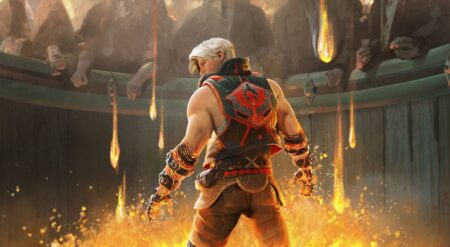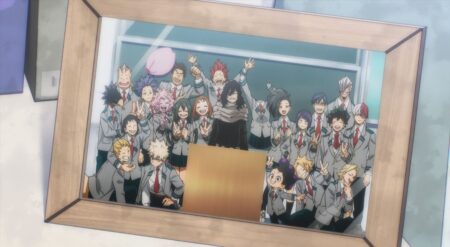
DC’s Legends of Tomorrow was one of The CW’s most popular and critically acclaimed shows. Besides being very diverse for a mainline superhero show, it touched on almost every genre you could think of, and with its delightful cast and witty writers, both sets of whom are now on strike, it created something strikingly memorable. Along with her fellow co-showrunners, writer and co-showrunner Keto Shimizu was a pivotal part of making it the success it was. Many fans bemoaned its somewhat abrupt cancellation back in 2022.
We caught up with Keto Shimizu after her panel at San Diego Comic-Con 2023, “Intro to TV Writing.” Here, she and other writers from the Arrowverse discussed their creative process and what studios need to do help writers succeed. We discussed her career, whether there was a chance for Legends of Tomorrow if creators had a better deal with studios, how she brings her own experiences to the characters she writes and much more.
This interview has been edited for length and clarity.
BUT WHY THO: If you’re able to talk about it as a WGA member, I want to ask about shows you’ve written, and shows ran that may have been canceled in the last few years. Regarding canceled shows and deals with the studios, do you think that if there were better guarantees from the studios your work could have continued, in any sort of capacity?
Keto Shimizu: I can’t speak to that specifically. But I will say a lot of what happened to the particular network that I was working with is really a result of larger consolidations that have been happening all around our industry. That network was bought, and the goals and the priorities of that network changed and with that change of ownership and it required a new direction from what that network had been doing for a decade plus with the sorts of programming that I was involved in. So it I think what’s happening now with the strike and with the mounting frustrations, and these existential issues that are plaguing our industry, even as a whole, not just the writers, but everyone’s feeling this as a result.
These conglomerates are getting bigger and bigger. But the industry at large is getting smaller as a result. And the goals of these conglomerates are really focused on the bottom lines. It’s numbers, it’s all about cash flow and how to minimize costs and drive up profits and make their investors and their stockholders happy. And for the network that I was on, and the show that that I was part of, it meant that something that didn’t make a ton of money for them cost a lot relatively for the network. Not that the show didn’t have that large of a budget, but the new owners didn’t feel like they could sustain it. It meant that something had to go, and a lot of things went, and it was really sad, and it really ended this era of television.
And this network, in a way, felt like a holdout for what was sort of happening across the industry. And it was this wonderful place where someone like me, who entered that network as a story editor, could rise to become a co-showrunner, and I got the education I needed because I had opportunities to go on set we were still on a network schedule, we were producing on set. Also, the room was running well. Post-production was happening. We were all there together, which meant that all writers could go to set and be real producers and get that context and education to grow.
With all these opportunities, they’d become real leaders as writers. So that was one of the last places I felt like where that was happening consistently until these mergers happened. And this buyout happened, and suddenly that was no longer a priority, and they’ve really completely changed the network now. It’s almost unrecognizable from what it was.
The WGA and SAG-AFTRA strike is still going to get fair wages and better employment protections. Want to learn more? Check out this interview.
BUT WHY THO: Yeah, totally. We’ve seen so many changes, especially pertaining to streaming versus the network. And there have been many discussions on how writers rooms have been affected. What is it been like to see SAG-AFTRA join the strike effort, and how much do you think that’s changing things right now?
Keto Shimizu: I obviously can’t speak to what this will change in the long run. I really can’t project any sort of timeline. I’m not as involved as some other people, such as some friends of mine who are deep in it. But I will just say that from my perspective on the front lines, on the picket lines, it’s been a real bolstering to have these fresh faces coming in and their energy. We’re all out there, and we are fighting, and we are there consistently and putting in our hours and getting our steps in and doing all of that, but WGA has been doing it for three months.
So to have this influx of people who are fresh-faced and ready to go and fired up, it’s been great in terms of morale and really feeling that surge of energy. We’ve all been steadfast soldier soldiers, and all of this, we’ve been there. But we’re all tired. We’re still gonna be there until Christmas if need be, but it is hard. It is hard, mentally, like mentally rough. It is physically exhausting. It is hot out there.
But I will say even before SAG-AFTRA came, so many of us have been out there and are so dedicated to this cause and to one another. People are just there for each other. It has been a very inspiring experience for me to just feel so connected to all these other writers. I’ve met a bunch of people on the lines, but I’m reconnecting with people I haven’t seen in a decade or people I worked with 12 years ago who I absolutely adore. I just haven’t had time to connect [with them], and just feeling that sense of community throughout all of this has been so awesome. And yeah, these fresh, beautiful faces coming from SAG-AFTRA have been great. But I will say there were SAG-AFTRA members there before their strike. That was wonderful just to have so early on. Other guilds showed up for us and have only strengthened the resolve. I think we’re feeling that across the guilds to make sure that we all get what we deserve in this fight. And to help each other to, bolster each other, and to be there for one another through this really hard time.

BUT WHY THO: 100%. On your panel, to shift gears a bit, you talked about writing your truth or writing what as it pertains to emotional truth. So, in general, how do you think that’s come across? With some of the characters, you’ve written?
Keto Shimizu: Well, I’d say for characters we’ve written recently, the storytelling that we did on that show was really about emotional connection. To people who you think are very different from you, and then turn out to not be so different. That was really what we were doing pretty consistently on that show. We would take these characters who came from very different backgrounds, different timelines, and different cultures, different sexualities, different belief systems, and put them on this spaceship and make them have to achieve these bat these gargantuan goals together every week. But what the real story behind all of that was, again, finding people who didn’t have a sense of community didn’t have a place in their worlds, or so they thought, outsiders, misfits, oddballs, who then found family and a sense of place in this in this these close quarters.
For me that comes directly from my life I was a strange kid growing up. I’m half-Japanese. I’m not quite Japanese, not quite white. I was a fangirl my whole life. I was always in love with comics and sci-fi. I didn’t have a lot of friends who were really into that. I was the one who was getting dressed up and standing outside the Montpelier theater alone for movie premieres because no one else in my class really did that. No one else in Vermont did that but I thought, “Okay, the new Star Wars is coming out. I’m going to dress up like Queen Amidala because I know that that’s what some people do in big cities,” but in Vermont, no one did that. I literally sat at stood out there for three hours in my Queen Amidala costume, waiting for the theater to open. And now here I am at Comic Con with all these incredible nerds and this incredible sense of community.
To me, the story of a misfit finding their place in community is so resonant and so meaningful and and just so important. Another thing that was weird about my childhood is I spent a lot of time on the road. I was a traveling musician. I was a singer and I was part of this group of total oddballs who would travel in a big painted hippie bus all around the country each night in a different location. We would put on a show and then would stay in people’s homes, and then we would go to another location. Does that sound familiar? We would make these wonderful personal connections with these people and these communities put on an incredible show for them, and then leave and go somewhere else. And meanwhile, growing very close to one another, like a family. Yeah. Does that sound familiar? Because that is what we wrote.
BUT WHY THO: As a WGA member who’s worked on so many really great things, you’re out there on the picket lines, but at the same time, I presume you still want fans to enjoy what you and other creators have made. What’s your message for fans on how they can support writers and actors?
Keto Shimizu: Oh, goodness. I think the best way to support us I mean, I certainly think voicing your support on social media. I don’t know how much that actually moves the dial, but it’s nice for us to see feel it, even when we can’t feel it directly. If you’re not in LA and can’t honk your horn, honk your horn on social media. That’s certainly a way to do it. Donate to the Entertainment Community Fund. Donate to funds like that to help crew members who are really struggling throughout all of this these people who are who worked their asses off when we’re when we’re up and running, and some of whom really do live hand to mouth and don’t have a big pocket of cash saved up for a time like this. That it means so much to to help provide some assistance in that regard. Whatever you can offer. I think that’s a very meaningful way to to help us is to protect the most vulnerable in our ranks.
Legends never die, and that includes the legacy Keto Shimizu and her fellow writers brought to the beloved Legends of Tomorrow. We hope to see more work from her once the strike is resolved and writers have a fair deal. Until then, do as she suggested and continue honking your social media horn and donate to funds that help the workers most effected by the ongoing strikes.






